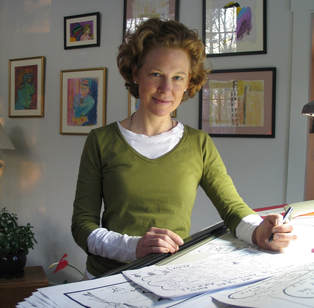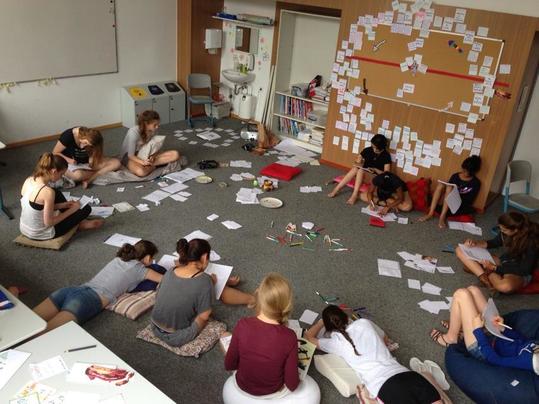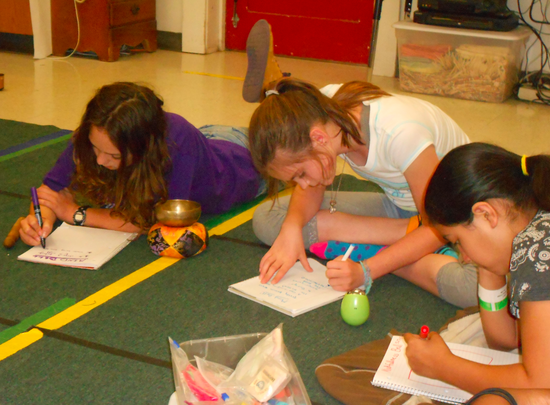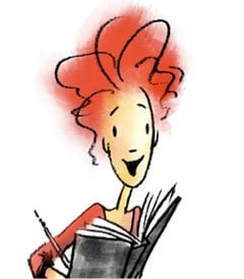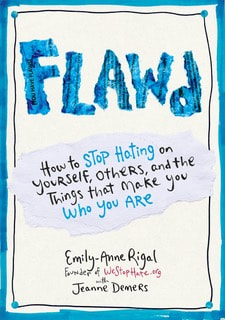September 2017 Featured Interview |
|
Interview with
Jeanne Demers
Founder of Realize Arts & Education, Inc.
Photo Credit: Elizabeth Vigeon
About Jeanne:
Jeanne Demers was educated in theater arts and working as an actress off-Broadway when she stumbled upon a conference on arts in education. The experience was a defining moment for her as it revealed her profound desire to ensure that young students are given the same opportunities to explore the arts as she had been given in her early years. In 1993, she founded Realize Arts & Education, Inc., a not-for-profit organization dedicated to utilizing the arts to enhance education. She worked with several school districts in New York to facilitate programs and courses that would enable students to realize their gifts and use their creativity to learn story-telling techniques, goal-setting, collaborative writing skills, how to nurture a positive self-esteem, and how to learn from mistakes. “The Hero’s Journey” was one such after-school program that allowed students to explore the structure that underlies most of the world’s stories and myths. Through collaboration, students created projects that were produced and performed for the public.
Jeanne then created The Ruby Books series, inspired by her work through Realize Arts & Education. This series provided a collaborative writing, drawing and learning environment which empowered girls to find a voice and speak truth. She utilized Facebook as a platform for girls to create pro-social movements of their own. WeStopHate, an initiative to combat bullying, and the self-help book FLAWD: How To Stop Hating On Yourself, Others and the Things That Make You Who You Are (TarcherPerigee) were both inspired by The Ruby Books series and online collaboration.
Jeanne’s latest endeavor, a program called “Unblock Your Brilliance,” combines the “Hero's Journey” narrative storytelling techniques, mindfulness meditation and EFT Tapping to give people of all ages the tools they need to work through the things that are holding them back, such as procrastination and perfectionism.
Jeanne Demers was educated in theater arts and working as an actress off-Broadway when she stumbled upon a conference on arts in education. The experience was a defining moment for her as it revealed her profound desire to ensure that young students are given the same opportunities to explore the arts as she had been given in her early years. In 1993, she founded Realize Arts & Education, Inc., a not-for-profit organization dedicated to utilizing the arts to enhance education. She worked with several school districts in New York to facilitate programs and courses that would enable students to realize their gifts and use their creativity to learn story-telling techniques, goal-setting, collaborative writing skills, how to nurture a positive self-esteem, and how to learn from mistakes. “The Hero’s Journey” was one such after-school program that allowed students to explore the structure that underlies most of the world’s stories and myths. Through collaboration, students created projects that were produced and performed for the public.
Jeanne then created The Ruby Books series, inspired by her work through Realize Arts & Education. This series provided a collaborative writing, drawing and learning environment which empowered girls to find a voice and speak truth. She utilized Facebook as a platform for girls to create pro-social movements of their own. WeStopHate, an initiative to combat bullying, and the self-help book FLAWD: How To Stop Hating On Yourself, Others and the Things That Make You Who You Are (TarcherPerigee) were both inspired by The Ruby Books series and online collaboration.
Jeanne’s latest endeavor, a program called “Unblock Your Brilliance,” combines the “Hero's Journey” narrative storytelling techniques, mindfulness meditation and EFT Tapping to give people of all ages the tools they need to work through the things that are holding them back, such as procrastination and perfectionism.
Myrna Beth Haskell, managing editor, spoke to Jeanne about her journey and the things that excite her about utilizing the arts to educate our youth.
As the founder of Realize Arts & Education, could you tell me a bit about the inspiration behind starting this not-for-profit organization?
|
In the early 1990’s, I was in New York City acting off-Broadway with a repertory company. I don’t remember why, but I ended up at roundtable conference for Arts in Education. I joined this tribe of people who were just as passionate about the arts and the role of the arts in education as I was. At the time, the arts were actively being removed from New York schools, and there were those who wanted to express a resounding HELL NO. I realized that I wanted students to have what I had been exposed to at a young age, so I literally reorganized my life to address this issue.
I founded Realize Arts & Education, Inc. in 1993. I moved from New York City to Woodstock, NY, where I thought it would be easier to implement some of my ideas in schools. I had story material that I wanted to try with the students – to see if it had legs. I wasn’t an educator, so looking back, it’s a wonder that I was able to create arts-based, after-school programs…but I was, and I did. I needed a team of non-profit experts to help with that side of things – consultants, a lawyer, a board. We decided on initiatives to collaborate with local schools to create developmentally appropriate workshops and courses. |
Photo Credit: Jeanne Demers
"Thinkpeace Workshop" for Girls: Writing personal heroic journeys Berlin, Germany (2013) |
One was called “The Hero’s Journey” to introduce elementary and middle school students to the structure that underlies most of the world's stories and myths. I assisted students in creating narratives of their own “hero’s journey,” and we developed a group piece produced and performed for the public.
|
Could you describe how the various workshops and courses you’ve conducted have helped students learn subject matter in a more comprehensive way?
I was so enthusiastic, but so clueless. These kids were so hungry for the arts that they showed up every day like it was their job. However, I lacked formal training in working with groups of kids. I had envisioned working with them in a “production house” kind of way where we would spend a few hours after school every day working on the “hero’s journey” story structure. It didn’t take long for me to run out of things to do with them. So, I came up with an idea to turn the tables. I call it a “reverse mentorship.” I asked, “If you were to create an after-school program based on this material for kids a little bit younger than you, what would you have them do?” Well, they went to town creating ways of exploring and reinforcing the ideas within the hero’s journey. I hadn’t intended things to go this way, but by giving them responsibility and ownership of the creative process, the subject matter became THEIRS. I facilitated their ideas. If a student wanted to bring dance to a part of the story, I’d bring someone in who could help with that. It was amazing. They just ran with it! |
Photo Credit: Jeanne Demers
Girls Empowerment Network (GEN): Writing after "listening" meditation practice - Austin, TX (2013) |
When school districts discuss budget cuts, the first programs that seem to be put on the chopping block are fine arts and musical arts programs. In your opinion, what would be the negative effects of these types of cuts, and what would students be missing out on?
I don’t think it’s too over-the-top to say it would be criminal. It kills something essential in us when we don’t have that way of tapping into our creative side. The arts give us a lifelong love of learning. The arts inspire and excite. Students learn more because their curiosity and interest is piqued through the arts. If you don’t love learning, you’re sunk.
Learning is not supposed to be a chore or an energy suck. It’s supposed to feel like the opposite of that. Learning, by its very nature, is challenging. That’s why there’s a “learning curve.” It takes time to get something new under your belt. You’re not going to give it that time if it doesn’t engage you. When the arts are used to educate, the challenging process of learning feels alive, engaging and immediate. It’s experiential…it’s embodied. When you kill the love of learning in a young person by taking all the fun out of it, it is a kind of death sentence. The arts engage us, they inspire us, and they uplift us. They belong hand-in-hand with the education process.
I don’t think it’s too over-the-top to say it would be criminal. It kills something essential in us when we don’t have that way of tapping into our creative side. The arts give us a lifelong love of learning. The arts inspire and excite. Students learn more because their curiosity and interest is piqued through the arts. If you don’t love learning, you’re sunk.
Learning is not supposed to be a chore or an energy suck. It’s supposed to feel like the opposite of that. Learning, by its very nature, is challenging. That’s why there’s a “learning curve.” It takes time to get something new under your belt. You’re not going to give it that time if it doesn’t engage you. When the arts are used to educate, the challenging process of learning feels alive, engaging and immediate. It’s experiential…it’s embodied. When you kill the love of learning in a young person by taking all the fun out of it, it is a kind of death sentence. The arts engage us, they inspire us, and they uplift us. They belong hand-in-hand with the education process.
I’m very interested in The Ruby Books series because the books empower young girls to be their best selves and to follow their goals. Could you tell me a bit about the series and some of the projects that were offshoots of the series?
|
The Ruby Books was an offspring of my work with Realize Arts & Education. The series gives girls the opportunity to engage the spirit of Ruby and find their own way. Ruby is a spokesperson for the “girl voice” in the world. Actually, she is me in the third person. I love how girls think. I wanted girls to have the same excitement about their voice as Ruby and to also have a comfortable way to share it.
I started with Facebook. Inspirational questions were asked, such as “If you came here from elsewhere in the universe, and you looked around at what you saw going on, what would you want to say to the inhabitants of earth before you left?” The girls were extremely engaged and came up with their own characters, which gave them the ability to talk honestly about their feelings, fears and dreams. |
Ruby illustrator: Verne Lindner
|
Other projects sprung from this. The Ruby Girl Cards were created when an artist translated their quotes and ideas. The multi-volume series was also adapted into a screenplay titled, "A White Girl Finds the Funk" and into “Ruby’s Writing Club,” an online interactive learning environment that uses the power of storytelling to inspire and empower girls to tell their own stories and find their voices as writers.
I’ve heard you’ve given seminars based on the book FLAWD: How To Stop Hating On Yourself, Others and the Things That Make You Who You Are. As co-author and illustrator of this book, what do you hope the young reader will take away?
|
Click on cover to purchase
|
Again, this was yet another project that developed from my work with Realize Arts & Education. I was winging it at a tween girl summit in D.C. Emily-Anne Rigal was volunteering because she was an older teen at the time. She approached me and explained why she should be Ruby Advisor #1. It was great. She gave herself the position! She told me that she wanted to start a not-for-profit of her own.
Emily-Anne became the founder of WeStopHate. Originally, her organization functioned through Realize, but it deserved to be on its own. She was able to generate thousands of followers from her message to embrace your imperfections and to not let others bring you down. The WeStopHate wristbands became a huge thing. Then, Penguin Books approached her about doing a book based on the message. That’s where I came in. She asked me to help her write it. |
The book addresses the experience of dealing with the things we sincerely don’t like about ourselves. How do we deal with that stuff? By bringing a concept of play to it. The ability to bring playfulness to things – especially the hard stuff – makes it more likely that you’ll get something from a challenging experience, rather than it getting the better of you.
For example, “The Morbid Trick” is a game you can play with yourself to appreciate everything about your body and those things you take for granted. Here is how it works:
Step 1: Look at what you’ve got: Make a long list of things you take for granted (e.g. parts of your body and what you appreciate about your body).
Step 2: Take it all away: Imagine those things gone and lost forever. Feel the grief, the loss, the fear.
Step 3: Give it all back: Receive everything back - one at a time - so you can appreciate each and every part of you that is special.
Teen quote from book: “If I look at it long enough, and I look at every single scar and every single hair and everything, I make myself fall in love with it. And then I move onto the next body part...and the next body part. By the time I'm done, I feel awesome about myself, and I can attack any problem after that.”- Stevie Boebi
Play has been my greatest ally in life, so I’d love the readers of FLAWD to be inspired to use play as a daily practice. Can you play with your perspective? I do it by asking myself irreverent questions like “Who SAYS?” (“Who says having a loud voice isn’t ladylike?”), and then imaginative questions like “What IF?” (“What if a loud voice is a huge asset because I can make myself heard?" or “What if that means I’m capable being a great leader?”). It’s been my experience that when I play with what's tripping me up (bothering me, confounding me) in life, it changes into something that can build me up instead.
A bit more on FLAWD: Even though we exist in a culture that thrives on bullying us into believing we're never good enough as we are, FLAWD affirms that you are good enough, ready enough and important enough to be a “flawd” light in the world. Through dynamic stories and advice from teens and celebrities around the world, FLAWD will help you to see yourself as perfectly imperfect, to embrace all that makes you, YOU, and to treat life as playfully as possible.
For example, “The Morbid Trick” is a game you can play with yourself to appreciate everything about your body and those things you take for granted. Here is how it works:
Step 1: Look at what you’ve got: Make a long list of things you take for granted (e.g. parts of your body and what you appreciate about your body).
Step 2: Take it all away: Imagine those things gone and lost forever. Feel the grief, the loss, the fear.
Step 3: Give it all back: Receive everything back - one at a time - so you can appreciate each and every part of you that is special.
Teen quote from book: “If I look at it long enough, and I look at every single scar and every single hair and everything, I make myself fall in love with it. And then I move onto the next body part...and the next body part. By the time I'm done, I feel awesome about myself, and I can attack any problem after that.”- Stevie Boebi
Play has been my greatest ally in life, so I’d love the readers of FLAWD to be inspired to use play as a daily practice. Can you play with your perspective? I do it by asking myself irreverent questions like “Who SAYS?” (“Who says having a loud voice isn’t ladylike?”), and then imaginative questions like “What IF?” (“What if a loud voice is a huge asset because I can make myself heard?" or “What if that means I’m capable being a great leader?”). It’s been my experience that when I play with what's tripping me up (bothering me, confounding me) in life, it changes into something that can build me up instead.
A bit more on FLAWD: Even though we exist in a culture that thrives on bullying us into believing we're never good enough as we are, FLAWD affirms that you are good enough, ready enough and important enough to be a “flawd” light in the world. Through dynamic stories and advice from teens and celebrities around the world, FLAWD will help you to see yourself as perfectly imperfect, to embrace all that makes you, YOU, and to treat life as playfully as possible.

